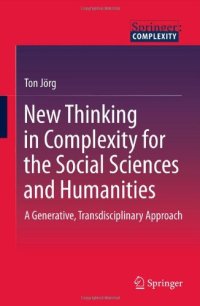
Ebook: New Thinking in Complexity for the Social Sciences and Humanities: A Generative, Transdisciplinary Approach
Author: Ton Jörg (auth.)
- Tags: Methodology of the Social Sciences, Complexity, Interdisciplinary Studies
- Year: 2011
- Publisher: Springer Netherlands
- Edition: 1
- Language: English
- pdf
This book focuses on the development of new thinking in complexity and on the tools needed for this new thinking, i.e. the development of a new language for complexity. This new language is very much about how a nonlinear complex reality is part of real-world complexity. We can start thinking in complexity about the complex topics of our social sciences and humanities by making use of this new language. With the new tools and the new language, it will be possible to deal with the complexity of real-world complexity and to show the promise of harnessing complexity, by turning complexity into effective and advantageous complexity for our social sciences and humanities. It is the very potential of complexity as self-potentiating which makes complexity so beneficial for viewing and doing social sciences. The new tools and the new thinking in complexity may be considered to be the warp and woof of a new science of complexity.
The underlying idea and motive for the book is that the notion of complexity may humanize the social sciences, may conceive the complex human being as more human, and turn reality as assumed in our doing social science into a more complex, that is a richer reality for all. The main focus of this book is on new thinking in complexity, with complexity to be taken as derived from the Latin word complexus: ‘that which is interwoven.’ The trans-disciplinary approach advocated here will be trans-disciplinary in two ways: firstly, by going beyond the separate disciplines within the fields of both natural sciences and social sciences, and, secondly, by going beyond the separate cultures of the natural sciences and of the social sciences and humanities.